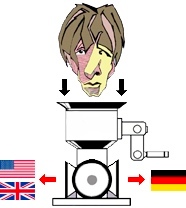| Pages in topic: [1 2] > | Addressing project managers formally or informally- thoughts? Thread poster: Elisabeth Coles
|
|---|
I was always taught that, when you are in a professional setting, you should always use formal pronouns (eg. vous instead of tu) unless specifically told otherwise. However, when I correspond with project managers in Italian I almost always find they tell me I can use informal pronouns with them, sometimes even after just the first message. I don't mind this at all, but as English doesn't really have the same sort of formal/informal pronoun structure, I feel like I'm lacking some social context.... See more I was always taught that, when you are in a professional setting, you should always use formal pronouns (eg. vous instead of tu) unless specifically told otherwise. However, when I correspond with project managers in Italian I almost always find they tell me I can use informal pronouns with them, sometimes even after just the first message. I don't mind this at all, but as English doesn't really have the same sort of formal/informal pronoun structure, I feel like I'm lacking some social context.
I don't know whether it's a generational thing or if they're simply being friendly, or perhaps this is something that is more common in Italy in particular rather than the rest of the world? Should I be starting out the conversation using the informal at the risk of sounding impertinent? I would really like to hear the opinion and experiences of other professionals on this. What do you do in this situation? Have you experienced something similar in your professional life? ▲ Collapse
| | | |
Maybe it was a particular PM in your case as I've always been addressed as Lei or vous, depending on the language an I answer likewise
| | | | Jan Truper 
Germany
Local time: 13:46
Member (2016)
English to German
Elisabeth Coles wrote:
I was always taught that, when you are in a professional setting, you should always use formal pronouns (eg. vous instead of tu) unless specifically told otherwise. However, when I correspond with project managers in Italian I almost always find they tell me I can use informal pronouns with them, sometimes even after just the first message. I don't mind this at all, but as English doesn't really have the same sort of formal/informal pronoun structure, I feel like I'm lacking some social context.
I don't know whether it's a generational thing or if they're simply being friendly, or perhaps this is something that is more common in Italy in particular rather than the rest of the world? Should I be starting out the conversation using the informal at the risk of sounding impertinent? I would really like to hear the opinion and experiences of other professionals on this. What do you do in this situation? Have you experienced something similar in your professional life?
In German, where we also have the formal/informal option, there has been a general trend towards informal addressing.
Big companies (Apple, Ikea, etc.) address their customers informally these days in ads, on websites and in stores. When I move around in Berlin, I use informal addressing towards pretty much anybody who seems about the same age or younger than me, in many settings that would have been strictly formal about 20 years ago. Using formal addressing has a bit of a connotation of "you're old / old-school / a dinosaur". I personally do not like being addressed formally.
When dealing with PMs, I generally converse in English, even when dealing with German PMs, so the question of formal/informal doesn't arise. Since I work mainly in "modern" sectors (gaming / film / TV), German conversations with PMs are usually informal.
[Edited at 2022-05-18 04:51 GMT]
| | | | Michael Newton 
United States
Local time: 07:46
Japanese to English
+ ...
| addressing managers. | May 18, 2022 |
Perhaps the best way is to start out formally and then let the other person take it from there. Some people will say "don't be so formal". But largely I think this is a matter of age/generation. In Japanese, this can be a minefield: "anata", "anta", "omae", "temae", "otaku", "otakusama", "kimi", "kisama" depending on the social status and the mood. Be glad it's a European language and it's a matter of either "tu" or "vous". In Asia, things can get more complicated.
| | |
|
|
|
Dan Lucas 
United Kingdom
Local time: 12:46
Member (2014)
Japanese to English
| The same plus a little bit? | May 18, 2022 |
Elisabeth Coles wrote:
I almost always find they tell me I can use informal pronouns with them, sometimes even after just the first message. I don't mind this at all, but as English doesn't really have the same sort of formal/informal pronoun structure, I feel like I'm lacking some social context.
A tricky one. I am scrupulously formal with my clients and in/with Japanese that works well.
I do have one Japanese client whose project managers are much less formal, and that creates a bit of a mismatch. I think it's related to the fact that instead of Japanese they like to use English.
As you imply, formality in English largely arises from of the degree of indirectness rather than explicit structures such as tu/vous in French (or, interestingly, Welsh, which has ti/chi).
Perhaps match the tone of the client, but with slightly more formality, just to emphasise respect?
Regards,
Dan
| | | | Samuel Murray 
Netherlands
Local time: 13:46
Member (2006)
English to Afrikaans
+ ...
Elisabeth Coles wrote:
I was always taught that, when you are in a professional setting, you should always use formal pronouns (eg. vous instead of tu) unless specifically told otherwise. However, when I correspond with project managers in Italian I almost always find they tell me I can use informal pronouns with them, sometimes even after just the first message.
I communicate in English only, but a similar or related thing happens in my e-mail correspondence: the first or first few messages in a thread are formal, and then it gradually becomes informal. The first message has a formal salutation and greeting, and so does my reply, and the client's first reply, etc. but by the second reply, we no longer use e.g. "Kind regards", and by a later e-mail, it turns into a sort of conversation where we don't even use "Dear so-and-so" at the top of the mail. Some clients switch to the informal format for all subsequent threads, too (i.e. if they send me another job 6 months later, they write the e-mail using an informal format). I play it safe by mimicking the client's style, except in cases were I have a friendly relationship with the client and I feel that they will respond well to a one-line reply (especially if the reply is good news instead of bad news).
As for polite vs familiar forms of address, this may depend on the language and culture, but it may also depend on the medium. Odds are those same Italians won't be addressing you so informally in person or in a paper letter as they do in an e-mail. Clients often wink at me in an e-mail -- it would be weird if they did that in person, too.
[Edited at 2022-05-18 06:27 GMT]
| | | | Baran Keki 
Türkiye
Local time: 14:46
Member
English to Turkish
| Cultural peculiarities | May 18, 2022 |
In Turkish, it's almost unthinkable to address a person by their first name, you have to put Mr. or Mrs. in front of their first name even if you conduct the conversation in the informal "tu"/"du" (there is also Sie/Vous in Turkish)
Addressing a woman, young or old, by their first name could be regarded as too forward and might even be considered as sexual harassment.
It's really funny/bizarre/ironic to see those persons, taking offense when they're called by their first names in T... See more In Turkish, it's almost unthinkable to address a person by their first name, you have to put Mr. or Mrs. in front of their first name even if you conduct the conversation in the informal "tu"/"du" (there is also Sie/Vous in Turkish)
Addressing a woman, young or old, by their first name could be regarded as too forward and might even be considered as sexual harassment.
It's really funny/bizarre/ironic to see those persons, taking offense when they're called by their first names in Turkish, addressing you with your first name and seemingly not caring when you do the same if you're talking to them in English. ▲ Collapse
| | | | Tom in London
United Kingdom
Local time: 12:46
Member (2008)
Italian to English
Most of my clients speak/write only in Italian.
If it's a new client they would normally make their first contact with me using the formal Lei.
I like that. It's respectful and professional. I respond in the formal.
If this initial contact leads to us working together and a friendly relationship is developing, I MIGHT suggest we change from the formal Lei to the informal TU but they always leave it up to me to ask.
What REALLY ANNOYS me and PUT... See more Most of my clients speak/write only in Italian.
If it's a new client they would normally make their first contact with me using the formal Lei.
I like that. It's respectful and professional. I respond in the formal.
If this initial contact leads to us working together and a friendly relationship is developing, I MIGHT suggest we change from the formal Lei to the informal TU but they always leave it up to me to ask.
What REALLY ANNOYS me and PUTS ME OFF is when an agency I've never worked with before uses the informal Tu. I instantly don't want to work with them. It's unprofessional and arrogant.
[Edited at 2022-05-18 07:58 GMT] ▲ Collapse
| | |
|
|
|
In general, Portuguese are very formal in business communication. I’d say that with most of my clients our email exchanges have been (mildly) formal. There’s just one exception: with my longest-standing customer (a Belgian agency) things got more informal over the years and we “tutoie” each other.
| | | | | What Tom in London says... | May 18, 2022 |
that's what I do too...
| | | | expressisverbis
Portugal
Local time: 12:46
Member (2015)
English to Portuguese
+ ...
| Using the person's name | May 18, 2022 |
Portugal is still a very traditional and conservative country, and this is also shown in business relations. We are friendly, but we like to stick to the formal way of addressing.
The proper form of address is the honorific title "senhor" for man followed by the surname and for woman, "senhora" or "dona" will be used followed by the first name.
Usually, for project managers I always use their first and last names when addressing them.
"A person’s name is to him or her the sw... See more Portugal is still a very traditional and conservative country, and this is also shown in business relations. We are friendly, but we like to stick to the formal way of addressing.
The proper form of address is the honorific title "senhor" for man followed by the surname and for woman, "senhora" or "dona" will be used followed by the first name.
Usually, for project managers I always use their first and last names when addressing them.
"A person’s name is to him or her the sweetest and most important sound in any language." - famous quote from Dale Carnegie.
In European Portuguese conversation (written or spoken), using "tu" is not polite at all when you don't know your interlocutor, but "você" irritates my eyes and ears. This is not quite welcome in Northern Portugal.
I believe Portugal keeps a certain and very specific way of adressing which is not quite easy to be understood by other different countries.
[Edited at 2022-05-18 12:23 GMT] ▲ Collapse
| | | | Baran Keki 
Türkiye
Local time: 14:46
Member
English to Turkish
expressisverbis wrote:
Portugal is still a very traditional and conservative country, and this is also shown in business relations. We are friendly, but we like to stick to the formal way of addressing.
The proper form of address is the honorific title "senhor" for man followed by the surname and for woman, "senhora" or "dona" will be used followed by the first name.
Usually, for project managers I always use their first and last names when addressing them.
"A person’s name is to him or her the sweetest and most important sound in any language." - famous quote from Dale Carnegie.
In European Portuguese conversation (written or spoken), using "tu" is not polite at all when you don't know your interlocutor, but "você" irritates my eyes and ears. This is not quite welcome in Northern Portugal.
I believe Portugal keeps a certain and very specific way of adressing which is not quite easy to be understood by other different countries.
[Edited at 2022-05-18 12:23 GMT]
Do they (strangers) call you "senhora" or "dona" on Portuguese forums or on Kudoz? Mr./Mrs. (Bey/Hanım) thing is not just limited to formal business correspondences, everybody on Turkish Kudoz section seems to address each other that way. Once, in my haste, I addressed a female colleague by her first name (as if I were talking to her in English) and it nearly cost me Kudoz points 
It's also considered bad manners in Turkey to address a person by their first name if that person is 7 or 10 years older than you, but I don't think that's relevant for the discussion here.
| | |
|
|
|
Elisabeth Coles 
United Kingdom
Local time: 12:46
French to English
+ ...
TOPIC STARTER | This is how I thought it would be | May 18, 2022 |
Samuel Murray wrote:
I communicate in English only, but a similar or related thing happens in my e-mail correspondence: the first or first few messages in a thread are formal, and then it gradually becomes informal. The first message has a formal salutation and greeting, and so does my reply, and the client's first reply, etc. but by the second reply, we no longer use e.g. "Kind regards", and by a later e-mail, it turns into a sort of conversation where we don't even use "Dear so-and-so" at the top of the mail. Some clients switch to the informal format for all subsequent threads, too (i.e. if they send me another job 6 months later, they write the e-mail using an informal format). I play it safe by mimicking the client's style, except in cases were I have a friendly relationship with the client and I feel that they will respond well to a one-line reply (especially if the reply is good news instead of bad news).
As for polite vs familiar forms of address, this may depend on the language and culture, but it may also depend on the medium. Odds are those same Italians won't be addressing you so informally in person or in a paper letter as they do in an e-mail. Clients often wink at me in an e-mail -- it would be weird if they did that in person, too.
[Edited at 2022-05-18 06:27 GMT]
I thought this would be the case, but I have multiple PMs across different translation agencies firing straight into informal, even if theirs is the first email in the chain. I even have one or two who will start their email with "Ciao cara" or "Hello dear", depending on which language they're using! As I say I don't mind, and I tend to agree with your point (and the general consensus) on playing it safe and starting off with the formal, then mimicking the client's tone. I have to say I find it very interesting that this is not something people are experiencing across the board, though.
| | | | expressisverbis
Portugal
Local time: 12:46
Member (2015)
English to Portuguese
+ ...
Baran Keki wrote: Do they (strangers) call you "senhora" or "dona" on Portuguese forums or on Kudoz? Mr./Mrs. (Bey/Hanım) thing is not just limited to formal business correspondences, everybody on Turkish Kudoz section seems to address each other that way. Once, in my haste, I addressed a female colleague by her first name (as if I were talking to her in English) and it nearly cost me Kudoz points  It's also considered bad manners in Turkey to address a person by their first name if that person is 7 or 10 years older than you, but I don't think that's relevant for the discussion here.
On Portuguese forums members call me by my first name, "expressisverbis" or even "asker".
"Senhora" or "dona" is more used for elderly people when we don't know their names and in different contexts other than a professional context like Proz.
So, "Merhaba Mr Keki", should I say?
P.S.: I forgot to add in my previous post: if a Spanish addresses me as "tu" or a Brazilian as "você", I'm not going to get offended because I know it's their own form of adressing.
What I really can't stand is rude people.
[Edited at 2022-05-18 16:07 GMT]
| | | | Baran Keki 
Türkiye
Local time: 14:46
Member
English to Turkish
expressisverbis wrote: Baran Keki wrote: Do they (strangers) call you "senhora" or "dona" on Portuguese forums or on Kudoz? Mr./Mrs. (Bey/Hanım) thing is not just limited to formal business correspondences, everybody on Turkish Kudoz section seems to address each other that way. Once, in my haste, I addressed a female colleague by her first name (as if I were talking to her in English) and it nearly cost me Kudoz points  It's also considered bad manners in Turkey to address a person by their first name if that person is 7 or 10 years older than you, but I don't think that's relevant for the discussion here. On Portuguese forums members call me by my first name, "expressisverbis" or even "asker". "Senhora" or "dona" is more used for elderly people when we don't know their names and in different contexts other than a professional context like Proz. So, "Merhaba Mr Keki", should I say?
So a complete Portuguese stranger can say "Hi Sandra, thanks for your reply" on a Kudoz thread? That's what I was wondering about. That's not the case in Turkish, they would say "Hi Mr. Baran, thanks for your reply".
Don't get me wrong, I find this totally ridiculous, but it's a cultural thing and there is nothing I can do about it. For instance, you're familiar with that Turkish guy called Atıl here, right? There's no way I can just call him "Atıl" on a Turkish forum thread even if I'm familiar with the guy (I have to call him "Mr. Atıl"), but if I were to address him on an English forum thread, then I could just call him "Atıl" and he probably wouldn't mind me doing that. I don't know if this makes any sense to you. But that's how it is..
Please don't ever call me "Mr. Keki", the sound of it reminds me of a certain Luxembourgian character 
| | | | | Pages in topic: [1 2] > | To report site rules violations or get help, contact a site moderator: You can also contact site staff by submitting a support request » Addressing project managers formally or informally- thoughts? | Wordfast Pro | Translation Memory Software for Any Platform
Exclusive discount for ProZ.com users!
Save over 13% when purchasing Wordfast Pro through ProZ.com. Wordfast is the world's #1 provider of platform-independent Translation Memory software. Consistently ranked the most user-friendly and highest value
Buy now! » |
| | Protemos translation business management system | Create your account in minutes, and start working! 3-month trial for agencies, and free for freelancers!
The system lets you keep client/vendor database, with contacts and rates, manage projects and assign jobs to vendors, issue invoices, track payments, store and manage project files, generate business reports on turnover profit per client/manager etc.
More info » |
|
| | | | X Sign in to your ProZ.com account... | | | | | |





















